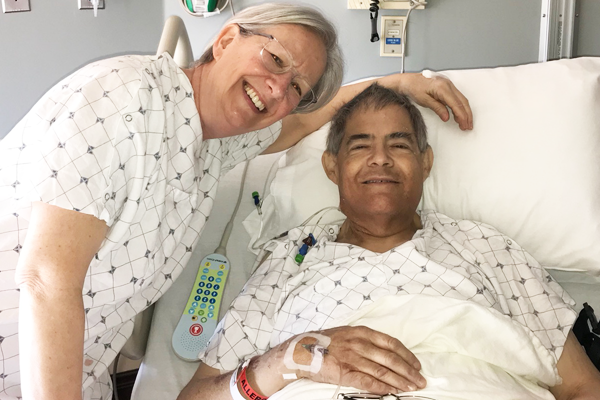
Excerpt from the WSURA newsletter, The Extension
Last September 19, Joyce Howes opened her email and changed two lives. She read an appeal from a man whose name she recognized from her years at Wright State, Phil Combs, who was on the staff for the Center for Teaching and Learning. Phil needed a kidney. His kidneys had been damaged by decades of diabetes. He had started dialysis the year before. He was on the wait list for a cadaver kidney, but those waits can sometimes be long. Five friends had volunteered to be donors, but none of them was a match. His situation was complicated by the fact that his job was eliminated in the ongoing budget crisis and his employment at WSU was going to end on October 27.
Joyce responded to Phil’s appeal immediately (almost impulsively, she says), mostly out of anger over Phil’s situation, but also because she was a life-long nurturer. Phil put her in touch with the University of Cincinnati Health Center to begin the process. The initial blood test showed a probable match and thus began a long series of medical tests to determine whether she was sound enough physically and mentally at age 66 to go through the three-hour surgery. She cleared the last hurdle in January. Phil was thrilled and profoundly grateful to learn that he had a living donor! Joyce and Phil met for the first time soon after the good news.
Joyce’s family—to put it mildly—was not thrilled. Her older sister could not comprehend why she would do such a thing for someone she didn’t even know. Wasn’t it enough to be an organ donor after death? Her daughter, Darcy, was also opposed. She didn’t want her mother to take the risk. But Joyce was resolved. She believed her decision was based on a pragmatic rationale. It was based on the science, facts, data. The science had long since established that humans needed only one functioning kidney. And furthermore it was the “correct thing to do.” Understanding that they could not dissuade her, her family finally stopped arguing and fully supported Joyce throughout the process. Joyce, Phil and the UC transplant team made a plan. They would do the exchange in April, after the biology class Joyce was teaching had concluded.
The surgeries were scheduled for April 30. The very handsome (according to both Joyce and Darcy) Dr.Tayyab Diwan was Joyce’s surgeon. Despite thinking that he “looked about 22” Joyce was confident about the procedure. She had no fear, no last minute anxieties. Everything went like clockwork. Phil was prepped and ready in the next O-R. As soon as Joyce’s “spare” kidney was removed and cleaned up a bit, it was placed into Phil’s waiting body. Everything went well on his end too. The kidney started working immediately. Joyce felt well enough to visit Phil in recovery the next morning. The accompanying photo shows two people who look pretty pleased with what they’ve done.
Joyce went home that afternoon, took her pain meds and slept about three days. She has continued her recovery without incident and with very little pain. She was allowed to resume her walking program after two weeks and had just a couple of common sense restrictions on her activities. Phil was still in quarantine at the end of May because of the immune suppressant drugs he has to take. But he is feeling much better and looking forward to what his new life has to offer.
If anything, Joyce seems energized by her experience with kidney donation. In no way does she feel diminished or endangered. Scientist that she is, she did the research and learned that she has no higher risk for kidney problems than she did before the surgery. She admitted that she’s thinking about a small tattoo to commemorate the event to go with her other two discreet inkings. She hopes that her story will inspire others to become living donors. A kidney from a live donor is far better for the recipient than one from a cadaver. The plea “share your spare” stuck in her head, and Joyce, well, she thought “why not.” And of such are heroes made. They answer the call.
Those interested in exploring the possibility of kidney donation should contact the University of Cincinnati Kidney Program at 513 584 7001 or the National Kidney Foundation—513 961 8105 in Cincinnati or 614 882 8184 in Columbus.

